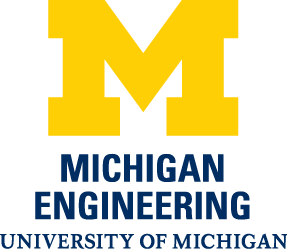
BSE in Computer Science Engineering 2015-2020
University of Michigan – Ann Arbor, MI
EECS 280 (Programming and Intro Data Structures)
- Functional Abstraction
- Specification
- Recursion
- Recursive/Iterative Invariants
- Functional Generalization
- Data abstraction
- Simple and Aggregate Types
- Abstract Data Types: ADTs
- Formal Notions of Type and Type Hierarchies
- Abstraction Functions and Representation Invariants
- Dynamic resource management
- Creation and Destruction
- Rules of Safety
- Container Types
- Container Iteration
- C++ Language and Programming
- Arrays
- File I/O
- Templates
- Exceptions
- Recursion
- Functors
- Structs, Classes, and Objects
- Overloading of Functions and Operators
- Pointers and dynamic arrays
EECS 281 (Data Structures/Algorithms)
Introduction to data structures and algorithms, algorithm analysis, and O-notation.
- Fundamental Data Structures
- Priority Queues
- Hash Tables
- Priority Queues
- Hash Tables
- Binary Trees
- Search Trees
- Balanced Trees
- Graphs
- Algorithm Analysis and O-Notation
- Searching and Sorting Algorithms
- Recursive Algorithms
- Basic Graph Algorithms
- Greedy Algorithms
- Divide and Conquer Strategy
EECS 285 (Java Applications)
Introduction to the Java language, with graphical user interfaces and mobile programming in Java.
- Java Language
- Syntax
- Control Flow
- Objects and Types
- Inheritance
- Polymorphism
- Nested and Local Classes
- Graphical User Interfaces
- Mobile Programming (Android)
Projects consist of simple Java applications, desktop game, and a Android budget tracking app
EECS 270 (Digital Logic Design)
- Binary and Non Binary Systems
- Boolean Algebra
- Logic Gates
- Circuits
- Standard Combinational Circuits
- Sequential Circuits
- Synthesis of Synchronous Sequential Circuits
- Arithmetic Circuits
- Computer Logic
- PLAs
- ROM
- RAM
- Computer-Aided Design
Laboratory includes hardware design (Using an FPGA and Verilog) and CAD experiments.
EECS 370 (Computer Organization)
- Instructions executed by a processor and how to use these instructions in simple assembly-language programs.
- Datapath and control for multiple implementations of a processor
- CPU Design
- Pipelining
- Caches
- Virtual Memory
- Input/Output
- Assembly language Programming.
Projects were written in C for a simple mock assembly language and processor called (LC2K). Projects consisted of an Assembler,CPU Simulator(simulate registers, memory, cache, etc.), Linker, Pipeline the Simulator, and a Cache Simulator
EECS 376 (Foundations of Computer Science)
An Introduction to Computer Theory
- Finite Automata
- Regular Languages
- Pushdown Automata
- Context-Free Languages
- Turing Machines
- Recursive Languages and Functions
- Computational Complexity
- Cryptography
EECS 441 (Mobile App Development for Entrepreneurs)
I took EECS 441 as my MDE (Major Design Experience). We spent the entire sememester working on a single project using the Agile process. The project can be found on my projects page.
- Mobile App Development
- Entrepreneurship
- Team Management
- Product Design
- Project Management
- Code Development
- Testing
EECS 484 (Database Management Systems)
Concepts and methods for the design, creation, query and management of large enterprise databases.
- Query Languages/Databases
- SQL
- Oracle SQL
- Embedded SQL
- Mongodb
- Database Design
- Integrity
- Normalization
- Transaction Management
- Access Methods
- Query Optimization
- Concurrency control and recovery
EECS 485 (Web Systems)
Concepts surrounding web systems, applications, and internet scale distributed systems. Projects include an Instagram clone in the first half of the semester, and a Google clone in the second. Projects Page
- Client/Server Protocols
- Web Security
- Information Retrieval and Search Engines
- DataBases and Scalable Data Processing
- Fault Tolerant Systems
- MapReduce
- Hadoop
EECS 490 (Programming Languages)
Fundamental concepts in programming languages.
- Programming Language Types
- Functional
- Imperative
- Object-Oriented
- Logic Programming Languages
- Programming Language Features
- Naming
- Modularity
- Concurrency
- Memory Management
- Control Flow
- Methodologies, Techniques, and Tools for Writing Correct and Maintainable Programs.
EECS 493 (User Interface Development)
Concepts and techniques for designing computer system user interfaces to be easy to learn and use, with an introduction to their implementation.
- Task Analysis
- Design of Functionality
- Display and Interaction Design
- Usability Evaluation
- Common Frameworks, Tools, HTML/CSS
- React.js
- Vue.js
- JQuery
- Node.js
- Executive Officer of Michigan Snowboard Club
- Member of Michigan Scandinavian Club
- Intramural Outdoor and Indoor Soccer
- 2019 Intramural Kick-Ball Champion